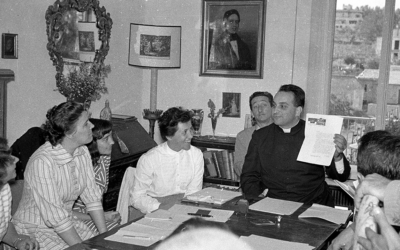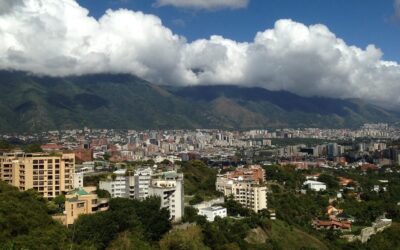![]() “Love, for example, is communion and leads to communion. Jesus in us, because he is Love, brought about communion.” – Chiara Lubich
“Love, for example, is communion and leads to communion. Jesus in us, because he is Love, brought about communion.” – Chiara Lubich
Their awareness that God shows his love through the circumstances of life, even the painful ones, gave the desire to the first focolarine who were in danger of losing their lives beneath the bombs, that they should be buried together in a single tomb with the inscription: “We have believed in love.” This awareness of being loved by God made them able to be ready to give their lives each for the other. This led to the sharing of all their spiritual and material possessions, the sharing of all their aspirations, of their fears, and their dreams.
Giosi Guella, one of the first focolarine shares about the first living conditions of Chiara and her first companions: “There wasn’t anything in Piazza Cappuccini. But, at the same time, there was everything: for us and for others. It was logical that there shouldn’t be anything: if there was something, we gave it away. We returned home with our salaries, and put them in common.” Our jobs, balancing our budget, studying, teaching, doing house chores, since they were all seen as service, became the concrete occasions to love our neighbours. Service was the rule of the community that was forming around the first Focolare and made you think of the first Christians who ‘were one heart and one soul and didn’t have any needy among them” (cf Acts 4:32-35).
Whoever adheres to the charism of unity, in one way or another communion of heart becomes a natural thing, putting into common the things one has: for some it means everything, for others something, for others what is extra. From these expressions of communion a far-reaching project has also been born, even from a theoretical point of view: the Economy of Communion, which is the mature and integral expression of a way of understanding the human person and living in service of him. Hundreds of businesses around the world belong to the Economy of Communion. In these businesses, work is envisioned as a way of nobilization of the human person. Legality and justice are daily priorities.
Chiara Lubich wrote: “The magna charta of Christian Social Doctrine begins there, where Mary sings: ‘He has put down the mighty from their thrones, he has raised up the lowly; he has filled the hungry with good things, and sent the rich away empty‘ (cf. Lk 1: 53-53). The highest and most uncontrollable revolution is found in the Gospel. And, perhaps, it is part of God’s plan that even in these times, immersed in finding solutions for social problems, it will be Our Lady who will give a hand to Christians in building, consolidating, constructing and showing to the world a new society in which the Magnificat will be powerfully echoed.”




0 Comments